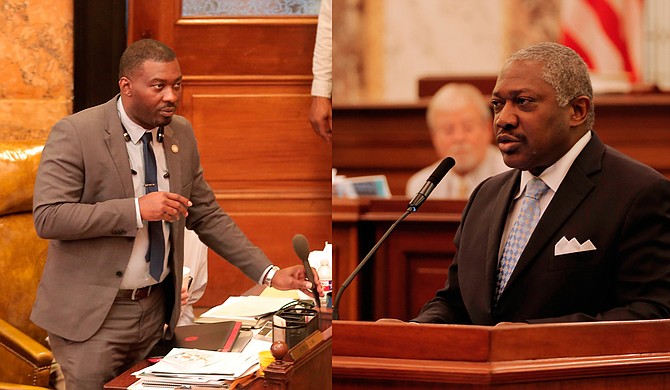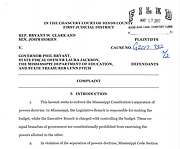Rep. Bryant Clark, D-Pickens, (left) and Sen. John Horhn, D-Jackson, (right) filed a lawsuit against the governor for implementing mid-year budget cuts to Mississippi Adequate Education Program. Photo by Imani Khayyam.
JACKSON — The fight to fully fund the Mississippi Adequate Education Program continues in the courtroom, as two Democrats filed a lawsuit against the governor, the state fiscal officer, the Mississippi Department of Education and the state treasurer. At this point, minority members of the Legislature, with its supermajority opposed to MAEP, have few options other than the courts.
Rep. Bryant Clark, D-Pickens, and Sen. John Horhn, D-Jackson, represented by the Southern Poverty Law Center, sued the state's executive officers responsible for mid-year budget cuts, which chopped almost $20 million from the Mississippi Adequate Education Program, the state's school-funding formula.
The two legislators' complaint focuses on enforcing the separation of powers between the legislative and executive branches of state government. They claim that the code section in Mississippi's state law that allows the governor and the executive branch to make mid-year budget cuts actually violates their constitutional charge as lawmakers to control the budget.
State law allows the state fiscal officer, currently Laura Jackson, who reports to the governor, to disapprove, reduce or revise the general and special funds to state agencies as long as cuts are no more than five percent.
If Jackson finds that "funds will not be available within the period for which the budget is drawn, or if at any time (s)he finds that the requested expenditures, or any part thereof, are not authorized by law," she will report those actions to the Legislative Budget Office."
Clark and Horhn allege that this part of state law allows the executive branch to infringe on the budget-making authority vested in the state Legislature. "In contrast, 'budget control' is an executive function, and is entirely separate from the budget-making process," the complaint says.
'Gray and Fuzzy Areas'
Separation-of-powers arguments are notoriously "gray and fuzzy areas" Mississippi College constitutional-law professor Matt Steffey says.
While holding court and writing and passing laws are clear functions of the judicial and legislative branches, respectively, the administrative agencies and quasi-government organizations that exist in the median are not so obviously controlled, Steffey told the Jackson Free Press.
The executive branch for the most part controls state agencies, either through appointing board members to manage the agency or directly managing it. Like most southern states, the governor is relatively weak in Mississippi. Gov. Phil Bryant does not have the power to fire state officials such as the attorney general or the insurance commissioner, for example.
While separation-of-powers cases can be fuzzy, Steffey said that Clark's and Horhn's challenge is odd. "The weird thing about this particular argument is that the legislators are challenging a law they passed," Steffey said in an interview.
Steffey used the example of a few minority-party U.S. congressmen who went to the courts right before the Gulf War, trying to get the judiciary branch to stop President George H.W. Bush from going to war.
"The judge said, 'Wait a minute, if you want to stop him ... if you think that war-making power belongs in Congress—then use it," Steffey said.
Essentially, a "separation of powers" challenge coming from members of one of the branches of government is much harder to get through a court than if an outside party brings a similar challenge. A group of school districts did challenge the State back in 2014, alleging that the Legislature was not passing its own law to fully fund public education. Former Gov. Ronnie Musgrove, a Democrat, appealed to the Mississippi Supreme Court for these school districts last week.
Mandate or Not?
On May 17, Musgrove argued that Section 201 of Mississippi's Constitution requires the Legislature to fully fund MAEP. Section 201 says, "The Legislature shall, by general law, provide for the establishment, maintenance and support of free public schools upon such conditions and limitations as the Legislature may prescribe."
Musgrove argued to the Mississippi Supreme Court that the word "shall" creates a mandate for the Legislature to fully fund the schools.
"It is a mandate because in (the) Pascagoula School District (case), this court said it was a mandate .... It is a mandate to establish, maintain and support a system of free and public schools," Musgrove argued.
Justice Jess Dickinson asked Musgrove what he wanted the court to do if he won his case. "You're suggesting we go down the path of becoming the appropriator that we order the funds to be paid and skip over the Legislature?" Dickinson asked.
"Your honor, it would be the same situation in any event that the Legislature failed to abide by a constitutionally mandated obligation," Musgrove said.
"Again, there is no excuse for failing to appropriate for the judiciary (branch) or the district attorneys—those are all constitutionally mandated statutes."
The state, represented by Justin Matheny, argued that Section 201 of the state's constitution is not a forcible mandate for the Legislature to appropriate specific amounts of money to school districts in the future.
"One Legislature, specifically in this case the 2006 Legislature, cannot control what future Legislatures must appropriate to school districts," Matheny told the court.
Musgrove told reporters after an hour of arguments that even if the Legislature changed the funding formula, which is within its discretion, lawmakers would still have to fully fund it. That conclusion, he said, is based on how he reads Section 201.
"The whole idea that you would pass a funding formula that complied with Section 201 of the Constitution and then put a paragraph in that says we can fund it at whatever level we choose, that's not complying with the Constitution," Musgrove told reporters.
Comment at and read more state news at jfp.ms/state.





Comments
Use the comment form below to begin a discussion about this content.
comments powered by Disqus